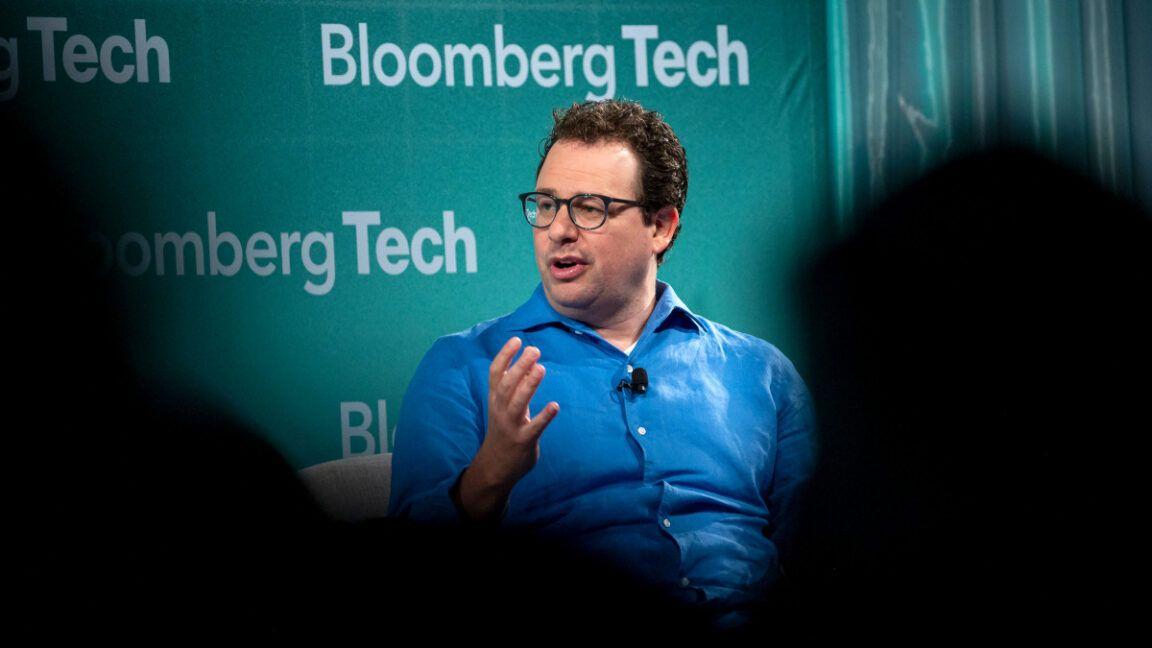Tech Giants Lobby Against State-Level AI Regulations in the US
2 Sources
2 Sources
[1]
Are OpenAI, Google, Meta plotting to take down state AI regulations?
US AI regulation 2025: Tech giants including OpenAI, Meta, and Google are stepping up efforts to block US states from regulating their rapidly growing artificial intelligence businesses, as per a report. These companies are lobbying both the White House and Republican-led Congress, after five states, including Texas, Colorado, California, Tennessee and New York passed significant AI-related laws, as reported by Bloomberg. Kouri Marshall, director of state government relations with tech trade group Chamber of Progress, pointed out that, "Lawmakers should be inviting innovation, not driving it away from the state," as quoted in the Bloomberg report. The group has major players like Andreessen Horowitz, Google, Apple, and Amazon among its members, according to the report. ALSO READ: Kamala Harris' '107 Days' book tour: Dates, cities, what to expect and when to get tickets While many of the new state AI regulations have yet to take full effect, industry advocates want to shift the focus away from regulating how AI is developed and instead concentrate on how AI is actually used by consumers and businesses, as per the Bloomberg report. After all, the companies that make early AI breakthroughs stand to gain trillions of dollars in market value, as reported by Bloomberg. Matt Perault, head of artificial intelligence policy at Andreessen Horowitz, highlighted that, "My hope is the focus moves away from trying to regulate development to regulating use" by individual customers, as quoted in the report. ALSO READ: Can ChatGPT help you get out of debt? What experts and users say about AI chatbots' financial advice In June, Republicans in Congress unsuccessfully tried to attach a 10-year ban on enforcing state AI regulations to US president Donald Trump's tax legislation, according to the Bloomberg report. Although that effort failed, tech companies successfully influenced White House advisers to version of the federal moratorium on state regulation in Trump's AI plan released in July, as per the report. That plan gives non-binding guidance to federal agencies, which includes a directive that AI-related federal funding should not go to states with "unduly restrictive" AI regulation, as reported by Bloomberg. While, industry lobbyists say companies are pushing again to attach the 10-year ban on state regulations to upcoming legislation, according to the report. ALSO READ: After billion-dollar hirings, Zuckerberg slams brakes on Meta's AI hiring spree as bubble fears shake Silicon Valley As AI technology increasingly takes on complex roles, such as screening job applications, identifying criminal suspects, processing medical claims, and creating realistic AI images, state lawmakers want to set some rules of the road, as reported by Bloomberg. However, federal AI legislation remains stalled due to political disagreements and opposition from tech-friendly lawmakers, according to the report. Meanwhile, some states are exploring rules that would require firms to conduct audits to prevent consumer harm, disclose when people are interacting with AI and ban the companies from copying artists' creative work, as reported by Bloomberg. ALSO READ: Move over quiet quitting -- as AI looms 'quiet cracking' is costing $438 billion and wrecking workers' health But the tech companies and venture capital firms which are backing AI startups worry that any regulation could slow their growth in this relatively new sector and navigating 50 different state rules would be a major challenge for the firms, according to the report. Hope Anderson, a privacy and AI lawyer with White & Case, told Bloomberg that the speed of technological change makes it "tricky" for the law to keep up, and more so if states enact a "patchwork" of differing regulations, as quoted in the report. Why are tech companies against state-level AI laws? Because 50 different rules would make it harder for them to scale and innovate quickly. What do the tech companies want instead? They prefer a single federal law focused on how AI is used, not how it's built.
[2]
Tech Companies Continue Push for Ban on State AI Regulations | PYMNTS.com
After an attempt to attach a 10-year ban to President Donald Trump's tax legislation failed in June, industry lobbyists aim to attach it to future legislation, Bloomberg reported Thursday (Aug. 21). In July, lobbyists successfully pushed for Trump's AI plan to include a directive to stop AI-related funding from going to states with "unduly restrictive" AI regulation, according to the report. States are considering a collective total of about 500 laws that would regulate the development and deployment of AI, the report said. Five states have already passed laws that apply to tech companies and more have passed ones that affect how businesses use the technology, per the report. Tech industry representatives argue that regulation would slow the development of AI, that a patchwork of state laws would be more difficult to deal with than federal legislation, and that regulations should apply to how the technology is used, rather than the tech itself, according to the report. Advocates of state regulations counter that the federal government has failed to pass comprehensive AI legislation, that the technology can be used to harm consumers and artists, and that states should be free to pass laws that protect their citizens, per the report. It was reported in June that the tech industry was divided over the proposed 10-year ban on state regulation of AI models. While some industry representatives said regulation would slow the progress of the technology and impede the U.S. in its competition with China, others said the ban would favor Big Tech companies and prevent accountability for those who build technology that could cause foreseeable harm. Senators voted 99-1 in July to remove the proposed ban from Trump's tax legislation. The move was seen as a defeat for Big Tech companies. It was reported in March that while state legislators were introduced AI-related bills at a record pace, the bills tended to have more of a pro-innovation intent than a stricter, European Union-style focus on reigning in risks.
Share
Share
Copy Link
Major tech companies like OpenAI, Google, and Meta are intensifying efforts to block US states from regulating AI, preferring federal oversight focused on AI usage rather than development.
Tech Giants' Push Against State AI Regulations
Leading technology companies, including OpenAI, Google, and Meta, are intensifying their efforts to prevent individual US states from regulating their rapidly expanding artificial intelligence businesses
1
. This lobbying campaign targets both the White House and the Republican-led Congress, following the passage of significant AI-related laws in five states: Texas, Colorado, California, Tennessee, and New York.The Industry's Stance
Tech industry representatives argue that state-level regulations could impede innovation and slow down AI development. Kouri Marshall, director of state government relations at the tech trade group Chamber of Progress, emphasized, "Lawmakers should be inviting innovation, not driving it away from the state"
1
. The group, which includes major players like Andreessen Horowitz, Google, Apple, and Amazon, is advocating for a shift in focus from regulating AI development to overseeing its actual use by consumers and businesses.Lobbying Efforts and Federal Moratorium
In June, Republicans in Congress attempted to attach a 10-year ban on enforcing state AI regulations to President Donald Trump's tax legislation, although this effort was unsuccessful
1
. However, tech companies did influence White House advisers to include a version of the federal moratorium on state regulation in Trump's AI plan released in July2
. This plan provides non-binding guidance to federal agencies, including a directive that AI-related federal funding should not go to states with "unduly restrictive" AI regulations.
Source: PYMNTS
State-Level Regulatory Landscape
Currently, states are exploring various regulatory measures, including:
- Requiring companies to conduct audits to prevent consumer harm
- Mandating disclosure when people interact with AI
- Banning companies from copying artists' creative work without permission
1
Approximately 500 laws regulating AI development and deployment are under consideration across various states
2
.Industry Concerns and Motivations
Tech companies and venture capital firms backing AI startups are concerned that navigating 50 different state rules would pose a significant challenge and potentially slow their growth in this emerging sector. Matt Perault, head of artificial intelligence policy at Andreessen Horowitz, stated, "My hope is the focus moves away from trying to regulate development to regulating use" by individual customers
1
.The stakes are high, as companies making early AI breakthroughs stand to gain trillions of dollars in market value. This potential windfall is driving the industry's push for a more unified, federal approach to AI regulation.
Related Stories
Opposition to State Regulations

Source: ET
Tech industry representatives argue against state-level AI laws for several reasons:
- The difficulty of scaling and innovating quickly under 50 different regulatory frameworks
- The preference for a single federal law focused on AI usage rather than development
- Concerns that regulations could slow AI progress and impede the U.S. in its competition with China
2
The Ongoing Debate
While the tech industry continues its lobbying efforts, advocates for state regulations counter that the federal government has failed to pass comprehensive AI legislation. They argue that states should have the freedom to protect their citizens, especially given AI's potential to harm consumers and artists
2
.As AI technology increasingly takes on complex roles in areas such as job application screening, criminal suspect identification, and medical claims processing, the debate over appropriate regulation is likely to intensify. The outcome of this legislative tug-of-war will significantly shape the future of AI development and deployment in the United States.
References
Summarized by
Navi
Related Stories
GOP Proposes 10-Year Ban on State AI Regulation in Budget Bill
13 May 2025•Policy and Regulation

Proposed Moratorium on State AI Regulations Sparks Debate in US Congress
22 May 2025•Policy and Regulation

Senate Rejects Ted Cruz's AI Regulation Moratorium in Overwhelming Vote
28 Jun 2025•Policy and Regulation

Recent Highlights
1
French Police Raid X Office as Grok Investigation Expands to Include Holocaust Denial Claims
Policy and Regulation

2
OpenAI launches Codex MacOS app with GPT-5.3 model to challenge Claude Code dominance
Technology

3
Anthropic releases Claude Opus 4.6 as AI model advances rattle software stocks and cybersecurity
Technology





